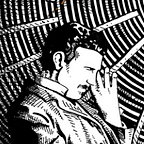Young Misfits: On Rosie Forrest’s ‘Ghost Box Evolution in Cadillac, Michigan’
Book Review by Leah Angstman
Leah Angstman talks about the Midwest, big-box stores, and surprises in Forrest’s award-winning flash chapbook.
Rosie Forrest
Flash Fiction | Chapbook | 56 pages | 5.4” x 6.1” | Reviewed: Chapbook
978–1–941628–01–0 | First Edition, Letterpressed | $12.00
Rose Metal Press | Brookline, Massachusetts | BUY HERE
As a Michigan native, I was immediately intrigued by the title of this book. I’ve been to Cadillac, Michigan, and I know firsthand that there’s not a whole lot there worth inspiring a book. Yet, Midwestern-born Rosie Forrest captures the mood of it perfectly. “Ghost boxes,” as it turns out, are what her protagonists call those empty big-box stores that swept into town, drove everything else out, then collapsed when we all realized they were just hanging out in the middle of nowhere, that we had to — ugh — drive to them, and that we could buy it all cheaper from Amazon, without leaving the couch.
These ghost boxes litter the landscape of the Midwest and litter the pages of Forrest’s chapbook — the rightful winner of the Rose Metal Press Annual Short Short Chapbook Contest — not only as empty box stores, but also as empty characters searching for that lost part of whatever they’ve left behind. The whole cadre of wanderers is endlessly searching, going where they are not supposed to go, and ending up somewhere else entirely:
The edge of the world is white, and we went there to pale ourselves and be done. We are headed to the lake and it’s forbidden. One toe on the ice sheet and we’re out. Josh trails us. Ice on bark distracts him. He walks in loops. Girl writing. I don’t know why we let him come.
(“Taps,” p. 34).
Forrest paints these characters flawlessly. Her prose is exquisite, and each line is such a delight that you scarce notice that you are reading about naughty children, wayward youths, derelict neighbors, rebellious girls, lost runaways, abandoned relatives, and all other manner of misfits and miscreants.
The protagonists have what all young misfits should have: innocence and heart, and it struggles against the lonesome, sad world of the Midwest. At the very core of each one is the battle of what it means to have a human connection, both with others and with the self. These stories are the definition of the human experience. Grounded in realism and exquisite real-world detail, yet surrounded in a surreal glow that would be granted to myths and legends, the pieces read like a cross between a moral fairy tale and an autobiography of the lost and wandering:
He showed us a road, which led down, and we went and we called out all the things we passed: a mini lighter, an advertisement for mattresses, a patch of wildflowers with names we did not know.
(“He Showed Us a Road,” p. 43–45).
Flash fiction is a tricky beast. It is not simply moored by word count, and it isn’t just a “short short story.” It has a life of its own that pulses. A middle without a beginning and end. It has a heart without the other organs. It is not a full story, but true to its name, it is a flash of one. It is not easy to define in the slightest; I can never tell you why a piece is wrong or why it is right, but when it is right, you simply know that it is. To do it well — truly well — is a feat rarely achieved. Randall Brown, Kathy Fish, Margaret Patton Chapman, Raymond Carver, and Grace Paley come to mind. And among them, Rosie Forrest easily fits in as a name to watch. Her prose is every bit as surprising and crisp. Her characters are never satisfied, and they yearn and they desire and they reach, and they reach right into you. They throw out fantastic quotes, like:
‘I’d pony up the midnight sun for a pulled pork sandwich.’ That’s how Uncle Bart implied he longed to move south.
(“Unmoored,” p. 17),
and they fight moments of desperation with that very human of responses: laughter. It will just strike you down in its perfection and timing.
My complaint would be, as it is with all delicious chapbooks, that it simply isn’t long enough. I could read a whole encyclopedia of Forrest’s work; and as an editor who thinks most authors’ works drone on chapters and chapters longer than they need to, I don’t say lightly that I want to read an encyclopedia of anything. For Forrest, I’d make an exception.
This review has been moved from its original home on The Spark blog, where it was first published on February 23, 2016. The Spark is now defunct, and all stories have migrated to The Coil for posterity.
